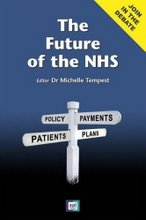 Our health service has been founded on the principle that healthcare should be freely available to all from cradle to grave, and that provision should be based on need rather than ability to pay. These noble aims and ideals have been translated within the NHS to create what is frequently described as a ‘beacon to the rest of the world’.
Our health service has been founded on the principle that healthcare should be freely available to all from cradle to grave, and that provision should be based on need rather than ability to pay. These noble aims and ideals have been translated within the NHS to create what is frequently described as a ‘beacon to the rest of the world’.This weekend Gordon Brown released his plan for the NHS: to devolve power away from politicians and create an NHS independent board. Basically, repeating his trick with the Bank of England by taking decisions away from ministers. This seems to be in tune with a recent YouGov poll carried out following the book ‘The Future of the NHS’ which found a two-to-one majority favouring the government withdrawing from day-to-day running of the NHS.
To give any possible future NHS independence board some idea of the mammoth task ahead, it’s worth noting that the NHS is the fifth largest employer in the world with 1.33 million people, behind only the Chinese army, the Indian Railways, Wal-Mart and the US department of defence. At any one time the total NHS population equals around the size of a small African country, such as Botswana. Thinking of the NHS as a country, and of this magnitude, really brings home some of the difficulties faced in how to manage an organisation with a vast number of patients, an unstable economy, an ageing infrastructure and an organisation that does not produce saleable goods.
On the face of it, an independent NHS board may look like a welcome reform, removing the temptation of politicians to meddle for short-term political gain. So why has the British Medical Association warned that the new proposals do not help address NHS problems? Perhaps, the reality is that by creating an independent board, it hands over an important part of our political system to an unelected group, and takes the decision-making process yet one step further away from the people it directly affects. After all, we already live in a society with 882 such quango bodies costing a total of £124 billion.
Next year sees the end of the increased level of spending pledged to the NHS and what will remains are some extremely difficult policy decisions to be made. The question then seems to become, is this new level of bureaucracy a method of passing the buck on political decisions?




1 comment:
Very good point. We've got too many unelected bodies in this country as it is.
Post a Comment